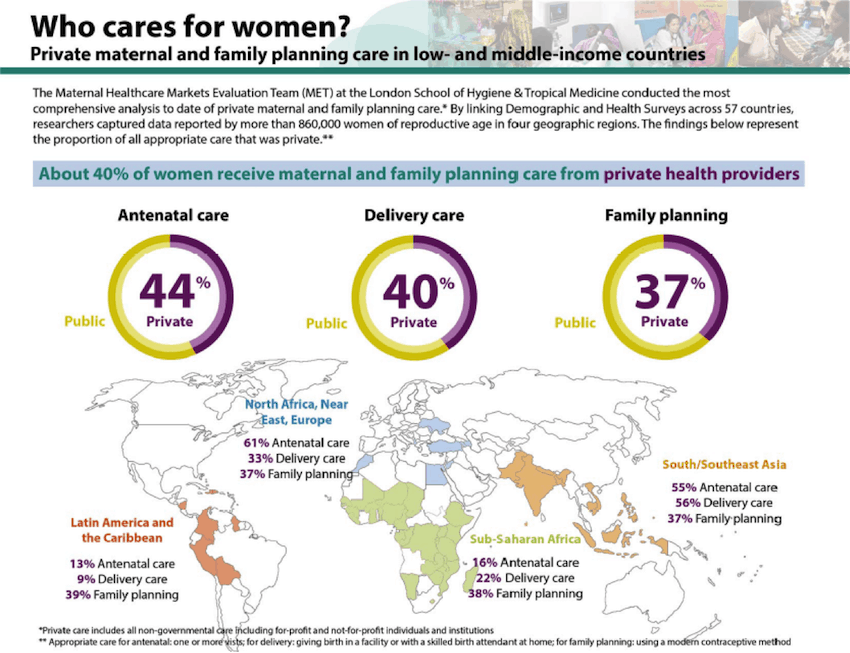Private Maternity Care Takes Center Stage
New research shows expansive role of PRIVATE providers in developing world
There’s a longstanding misconception that in developing countries, maternity care delivered by private health providers is a luxury reserved only for wealthy women. That’s why for years, the global health community has treated private care as an afterthought, with most policies and resources devoted to improving public health delivery. And when private care is mentioned, it is often in a negative context: the profit motive is at odds with good care, there’s inadequate regulation, the quality is mixed, it’s expensive – all legitimate concerns, of course.
But the reality is many more women than one might expect are getting their health care from private health providers. New research – funded by Merck through its Merck for Mothers initiative and conducted by the London School of Hygiene & Tropical Medicine – revealed that, in low- and middle-income countries, roughly 40 percent of women who receive maternal health care and family planning services do so from private providers. While the public sector provides most of the services, private doctors, midwives and nurses deliver a considerable proportion of antenatal care, delivery care and family planning services.

(The above graphic, which includes data reported by more than 860,000 women across 57 countries, was supplied by Rabin Martin.)
Whether one endorses private maternal health care or not, the reality is that two out of five women are receiving this care from private providers. We have to ensure that women have access to affordable, high-quality services wherever they seek care.
Fortunately, there’s now a growing realization that private care has a role to play in improving the health of pregnant women and new mothers. And, after years of being relegated to the sidelines of maternal health forums, we’re finally starting to hear the private sector voice at conferences like the FIGO World Congress and Global Maternal Newborn Health Conference, as well as at a recent event at the Wilson Center. There, participants grappled with how to extend affordable, high-quality maternal health care to all who need it and step up the quality of care to decrease the number of women dying in pregnancy and childbirth.
So what are some of the differences? Why are so many women choosing private care over public services? Through our own fact-finding missions in several countries in Africa and Asia we have learnt, from both experts and the women using these services, that private providers are often located nearer their homes, tend to better understand their cultural needs and customs, maintain longer and more flexible hours and are perceived to offer higher-quality services.
Of course, there are challenges in this sector, too. Ensuring quality across such a diverse group of providers, who range from midwives to doctors to drug shop owners, is no easy task. Because they tend to work independently, it’s difficult to standardize what they do. But if maternal health providers have the right incentives to offer quality care, they will surely strive to do so.
Merck for Mothers is looking into innovative ways to improve the quality of private maternal health care. To this end, we are exploring social franchising, accreditation and toolkits that are tailored to meet the specific needs of private providers. We are evaluating the impact of our programs and look forward to sharing the results.
Making sure that women have access to quality, private health care will become ever more critical as this sector is called on in the days and years ahead to help deliver on the Sustainable Development Goals, or more specifically, Goal 3 – “ensure healthy lives and promote well-being for all.” As much as the new global development framework is about “leaving no one behind,” it is also about involving as broad a range of actors as possible. No government could hope to achieve this ambitious new blueprint to end poverty without the help of other sectors. And the new framework gives unprecedented scope for everyone who wants – and clearly needs – to be a part of the solution.
We at Merck for Mothers are committed to playing our part to meet these challenges and to helping women get the care they need for a healthy pregnancy and safe childbirth. As long as they’re voting with their feet when it comes to private maternal health care, we should respect women’s choices and craft solutions that work for them.
Dr. Priya Agrawal, an obstetrician/gynecologist, is executive director of Merck for Mothers.
Photos courtesy of Merck for Mothers.
- Categories
- Health Care
